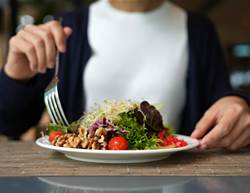- New research found that drinking fruit juice was associated with weight gain in children and adults.
- Researchers found that each additional serving per day of 100% fruit juice was associated with weight change.
- Experts explain the findings.
You might think that any fruit content that you consume is doing you some good. However, new research shows that certain ways of getting your daily fruit value are better for you than others.
A meta-analysis published in JAMA Pediatrics looked at how drinking 100% fruit juice may impact weight gain in children and adults. The researchers analysed 42 studies: 17 in children and 25 among adults.
For children, they found that each additional serving per day of 100% fruit juice was associated with a 0.03 higher body mass index (BMI) change. For adults, they found that each additional daily serving was associated with a slightly smaller 0.02 change in BMI. (Note: BMI is no longer considered a good indicator of health).
So, how might drinking fruit juice contribute to weight gain? When portions are not closely monitored it can be easy to get a lot of extra kilojoules from beverages like juice, sugar-sweetened beverages, and added enhancers like sugar or cream to tea and coffee, says dietitian Melissa Prest. “These extra kilojoules can add up over time which easily contributes to weight gain.”
The difference between eating fruit and drinking fruit juice also plays a factor. According to the Mayo Clinic, fruit juice contains most of the vitamins, minerals, and plant chemicals found in the fruit, but whole fruits and vegetables also have healthy fibre, which is lost during most juicing. When you drink fruit juice instead of eating whole fruit, you take away the fibre and the structural parts of the food, and our body digests and metabolises it differently.
Drinking fruit juice may also contribute to insulin resistance, which can lead to weight gain. A half-cup serving of juice, like orange juice, has about the same amount of carbohydrates as a slice of bread, says Prest.
“Most people do not drink a half-cup of juice and will drink two or three times the recommended serving. This leads to a high contribution of rapidly digested sugars that, when consumed habitually, can contribute to weight gain and insulin resistance,” she explains.
Consistently overconsuming juice, coupled with a family history of type 2 diabetes or being overweight or inactive, is a combination that may increase your chances of developing insulin resistance, agrees dietitian Jackie Newgent.
So, how much fruit juice should you be drinking every day? Australian guidelines say we should only occasionally have fruit juice, and to keep it to 125ml or ½ cup at a time. And that's only juice with no added sugar. If that feels like a small amount, try mixing it with some sparkling water, Prest suggests.
Keep in mind that a juice glass is not the same as a grab-n-go bottle, adds Newgent. Also, try to look for nutrient-rich “no sugar added” picks, like 100% pomegranate juice, unsweetened tart cherry juice, or fresh-squeezed orange or grapefruit juices, she suggests.
While the reasons for weight gain were not discussed in this study, it makes sense that weight and body mass index were higher in those who consumed more servings of fruit juice than in those who did not, says Prest. “It reinforces the notion that the kilojoules from our beverages can impact our weight and cause weight gain.”
But this doesn’t mean that you need to cut fruit juice out altogether. It can be part of a healthy lifestyle, says Newgent, but consider it as your number two; your backup plan. “Your best bet is to aim for whole fruit first for more fibre benefits and chewing satisfaction!” she adds.






.jpg&h=193&w=250&c=1&s=1)



